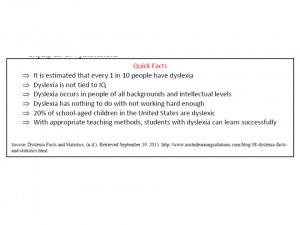Executive Summary
- In recent months, the Illinois General Assembly has had much debate over whether testing students for dyslexia should be mandated in all schools. Private testing can cost upwards of $500 and it limits families who are not able to afford it.
Dyslexia is a language-based learning disability or disorder that includes poor word reading, word decoding, oral reading fluency, and spelling.
Introduction
- This topic is important because it has the ability to help students in a positive way. The proposed bill plans to test children in kindergarten-first grade, it would give children the advantage to adjusting their academic learning experience at and early age and set the foundation for the rest of their education careers.
- People should care about this topic because signs of dyslexia can begin to show at age 6. Also, it is estimated that one in ten persons have dyslexia, so it is common that you, or someone you know has dyslexia.
- The goals of the research and implementing the bill will be to offer a solution for families who want to have their child(ren) tested but are not financially able to do so. Another goal is to build a stronger bridge between the school system and parents and come together for the common good of children.
- The overall findings of the research and proposed bill were that the general assembly needed more time to discuss and debate if they wanted to mandate dyslexia testing in schools. Some factors that I am sure they are taking into consideration are the cost of testing, where to get the proper tools for testing, and how it will effect IEP and 504 plans for students.
Approaches and Results
- Some facts about dyslexia are that dyslexia is not tied to a person’s IQ (intelligence quotient). Often times, people with dyslexia are very creative and artistic and can express themselves in other ways. Another fact about dyslexia is that people with dyslexia can learn ways that help them succeed academically through tutoring. Some dyslexia tutoring centers offer ways for students to spell out words, like sand and finger play, and then it also provides parents with tools to use at home when helping with homework.
- Issues that arise with this topic are that children in the school system who have already been diagnosed with dyslexia are not provided the resources that the proposed bill would. Also, although the proposed bill does not go into much detail about this, dyslexia is not a recognized disability in Illinois at this point and children with dyslexia are provided a 504 plan (a less regulated and non-binding contract between the student and teachers) and not an IEP (an Individualized Education Plan that binds the school to meet the academic accommodations of students with disabilities and other medically diagnosed learning difficulties). Also, the proposed bill does not mention anything about dysgraphia (the inability to write coherently)
- The context of the issue is the general assembly who has noticed a need to dyslexia testing in schools and working on implementing that into the school systems. The bill would also affect students, parents, teachers, and school board. Dyslexia is a relatively new learning challenge that scientists do not know much about in regards to what is causing it, but the General Assembly is attempting to be proactive in their approach to helping this new phenomenon.
Conclusion
- Based on the results of my research, I believe that dyslexia testing is necessary to help students succeed through diagnosis, intervention planning, and documentation. The basis of the testing would require all school districts in Illinois to screen all students in kindergarten-first grade in material related to dyslexic characteristics; such as letter naming, letter sound, and rapid naming. Each school district would then be required to evaluate the child’s family history of learning disabilities. Students in second grade will be tested on components of oral history and spelling. If a student demonstrates difficulty in any of the tested areas listed above, school districts will be provided with evidence-based supportive services and the parent(s) and or/guardian of the child will be informed of the results and provided educational resources as well. Mandatory dyslexia testing in schools would allow parents of lower socioeconomic status an equal opportunity to have their child tested.
- Some assertions that can be made is that parents with dyslexic children need the support from school districts, teachers, and the government help with success of the child. Hopefully, if the bill passes, the next step will be classifying dyslexia as a disability so students can get guaranteed academic accommodations.
Implications and Recommendations
- Your call to action here is to go to advocate at school board meetings and advocate for dyslexia accommodations for students who have dyslexia; regardless of whether or not his bill is passed. Also, speak out and make calls to your local state representative in to vote in favor of the bill if you feel inclined to do so. Speak to school teachers and inquire their view on dyslexia and what they are doing currently to accommodate for students with dyslexia. Another way to support this issue is to become involved with your local outlets and programs such as LEAP in the champaign-urbana area.
Support for dyslexia testing and awareness will significantly improve the educational success of today’s youth.
- IL General Assembly should implement the bill on December 15, 2015 and provide support for students and families with dyslexia. Even though they did not vote on the bill on their original date of July 31, I would assume that they are using this time to do more research about dyslexia testing and the benefits.
